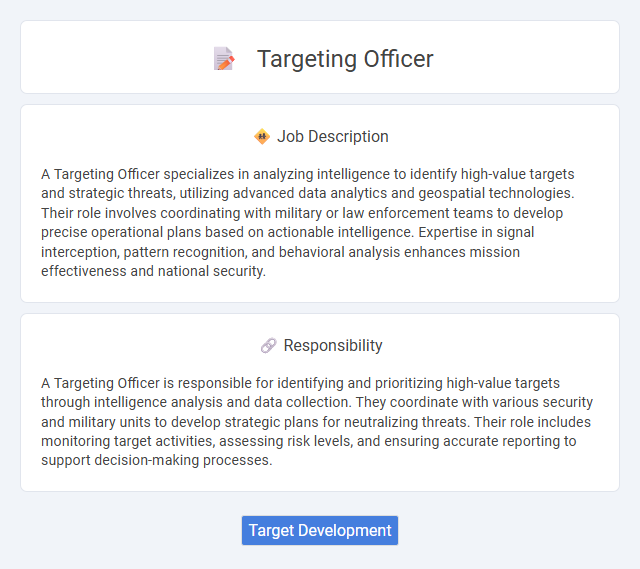
A Targeting Officer specializes in analyzing intelligence to identify high-value targets and strategic threats, utilizing advanced data analytics and geospatial technologies. Their role involves coordinating with military or law enforcement teams to develop precise operational plans based on actionable intelligence. Expertise in signal interception, pattern recognition, and behavioral analysis enhances mission effectiveness and national security.
Individuals with strong analytical skills and attention to detail are likely suitable for a Targeting Officer role, as the job requires assessing the condition and behavior of people accurately. Those comfortable working under pressure and making informed decisions based on intelligence reports may have a higher probability of success in this position. Candidates without effective communication skills or the ability to handle sensitive information might face challenges fitting into this job's demands.
Qualification
Targeting officer roles require strong analytical skills, proficiency in intelligence gathering, and expertise in data analysis tools. Candidates should possess a background in criminal justice, cybersecurity, or military studies, alongside experience with threat assessment methodologies. Advanced knowledge of geographic information systems (GIS) and risk management enhances effectiveness in identifying and prioritizing high-value targets.
Responsibility
A Targeting Officer is responsible for identifying and prioritizing high-value targets through intelligence analysis and data collection. They coordinate with various security and military units to develop strategic plans for neutralizing threats. Their role includes monitoring target activities, assessing risk levels, and ensuring accurate reporting to support decision-making processes.
Benefit
Targeting officers likely gain valuable skills in data analysis and strategic decision-making, enhancing career growth opportunities in security and intelligence fields. The role probably offers exposure to advanced technologies and collaboration with diverse teams, which may boost professional networks. Benefits might also include competitive compensation and the potential for contributing to national safety, fostering a sense of purpose and job satisfaction.
Challenge
The Targeting Officer role likely involves navigating complex datasets to identify high-impact targets, which can present significant analytical challenges. There is a probable need to balance accuracy with speed under pressure, potentially requiring quick decision-making in dynamic environments. This position may demand constant adaptation to evolving threats, increasing the difficulty of maintaining effective targeting strategies.
Career Advancement
Targeting officers specialize in analyzing data to identify high-value targets for law enforcement or military operations, leveraging advanced technologies and intelligence frameworks. Mastery of geospatial analytics, signal interception, and cyber intelligence enhances prospects for progression to senior analyst or strategic leadership roles. Continuous skill development in AI-driven targeting systems and interagency coordination significantly boosts career advancement opportunities within defense and homeland security sectors.
Key Terms
Target Development
Targeting officers play a critical role in target development by analyzing intelligence data to identify high-value targets and prioritize them for operational planning. They integrate multiple sources of information, including geospatial, human intelligence, and signals intelligence, to create actionable target packages. Their expertise ensures precise targeting decisions that enhance mission effectiveness while minimizing collateral damage.
 kuljobs.com
kuljobs.com